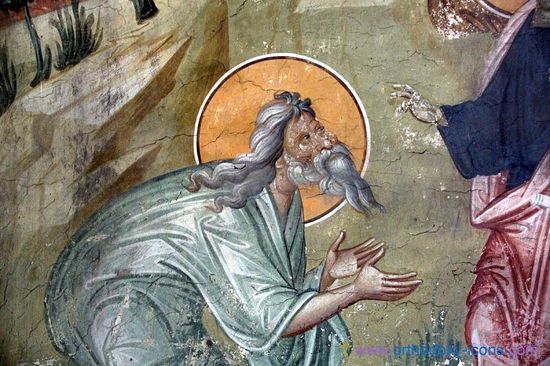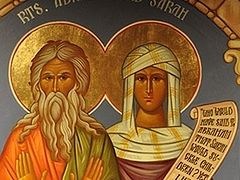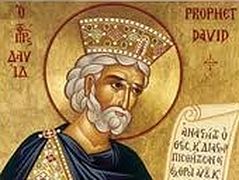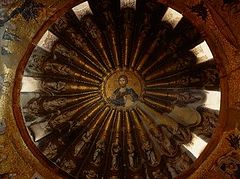Epistle Reading
By faith he dwelt in the land of promise as in a foreign country, dwelling in tents with Isaac and Jacob, the heirs with him of the same promise; For he waited for the city which has foundations, whose builder and maker is God. By faith Abraham, when he was tested, offered up Isaac, and he who had received the promises offered up his only begotten son, Of whom it was said, "In Isaac your seed shall be called," Concluding that God was able to raise him up, even from the dead, from which he also received him in a figurative sense. By faith Isaac blessed Jacob and Esau concerning things to come. By faith Jacob, when he was dying, blessed each of the sons of Joseph, and worshiped, leaning on the top of his staff. By faith Joseph, when he was dying, made mention of the departure of the children of Israel, and gave instructions concerning his bones. By faith Moses, when he was born, was hidden three months by his parents, because they saw he was a beautiful child; and they were not afraid of the king's command. And what more shall I say? For the time would fail me to tell of Gideon and Barak and Samson and Jephthah, also of David and Samuel and the prophets: Who through faith subdued kingdoms, worked righteousness, obtained promises, stopped the mouths of lions, Quenched the violence of fire, escaped the edge of the sword, out of weakness were made strong, became valiant in battle, turned to flight the armies of the aliens. Women received their dead raised to life again. And others were tortured, not accepting deliverance, that they might obtain a better resurrection. Still others had trial of mockings and scourgings, yes, and of chains and imprisonment. They were stoned, they were sawn in two, were tempted, were slain with the sword. They wandered about in sheepskins and goatskins, being destitute, afflicted, tormented—Of whom the world was not worthy. They wandered in deserts and mountains, in dens and caves of the earth. And all these, having obtained a good testimony through faith, did not receive the promise, God having provided something better for us, that they should not be made perfect apart from us.
Hebrews 11: 9-10, 17-23, 32-40
By faith Abraham obeyed
Great indeed was the faith of Abraham. For while in the case of Abel, and of Noah, and of Enoch, there was an opposition of reasonings only, and it was necessary to go beyond human reasonings; in this case it was necessary not only to go beyond human reasonings, but to manifest also something more. For what was of God seemed to be opposed to what was of God; and faith opposed faith, and command promise.
I mean this: He had said, Get thee out of thy country, and from thy kindred, and I will give thee this land. (Gen. 11:1, 7.) He gave him none inheritance in it, no not so much as to set his foot on. (Acts 7:5.) Seest thou how what was done was opposed to the promise? Again He said, In Isaac shall thy seed be called (Gen. 21:12 ), and he believed: and again He says, Sacrifice to Me this one, who was to fill all the world from his seed. Thou seest the opposition between the commands and the promise? He enjoined things that were in contradiction to the promises, and yet not even so did the righteous man stagger, nor say he had been deceived.
For you indeed, he means, could not say this, that He promised ease and gave tribulation. For in our case, the things which He promised, these also He performs. How so? In the world (He says), ye shall have tribulation. (John 14:33.) He that taketh not his cross and followeth Me, is not worthy of Me. (Matt. 10:38.) He that hateth not his life shall not find it. (John 12:25.) And, He that forsaketh not all that he hath, and followeth after Me, is not worthy of Me. (Luke 14:27, 33.) And again, Ye shall be brought before rulers and kings for My sake. (Matt. 10:18.) And again, A man's foes shall be they of his own household. (Matt. 10:36.) But the things which pertain to rest are yonder.
But with regard to Abraham, it was different. He was enjoined to do what was opposed to the promises; and yet not even so was he troubled, nor did he stagger, nor think he had been deceived. But you endure nothing except what was promised, yet you are troubled.
He heard the opposite of the promises from Him who had made them; and yet he was not disturbed, but did them as if they had been in harmony [therewith]. For they were in harmony; being opposed indeed according to human calculations, but in harmony [when viewed] by Faith. And how this was, the Apostle himself has taught us, by saying, "accounting that God was able to raise Him up, even from the dead." By the same faith (he means) by which he believed that God gave what was not, and raised up the dead, by the same was he persuaded that He would also raise him up after he had been slain in sacrifice. For it was alike impossible (to human calculation, I mean) from a womb which was dead and grown old and already become useless for child-bearing to give a child, and to raise again one who had been slain. But his previous faith prepared the way for things to come.
From St. John Chrysostom. Homily XXV on Hebrews 11.
Gospel Reading
The book of the genealogy of Jesus Christ, the Son of David, the Son of Abraham: Abraham begot Isaac, Isaac begot Jacob, and Jacob begot Judah and his brothers. Judah begot Perez and Zerah by Tamar, Perez begot Hezron, and Hezron begot Ram. Ram begot Amminadab, Amminadab begot Nahshon, and Nahshon begot Salmon. Salmon begot Boaz by Rahab, Boaz begot Obed by Ruth, Obed begot Jesse, And Jesse begot David the king. David the king begot Solomon by her who had been the wife of Uriah. Solomon begot Rehoboam, Rehoboam begot Abijah, and Abijah begot Asa. Asa begot Jehoshaphat, Jehoshaphat begot Joram, and Joram begot Uzziah. Uzziah begot Jotham, Jotham begot Ahaz, and Ahaz begot Hezekiah. Hezekiah begot Manasseh, Manasseh begot Amon, and Amon begot Josiah. Josiah begot Jeconiah and his brothers about the time they were carried away to Babylon. And after they were brought to Babylon, Jeconiah begot Shealtiel, and Shealtiel begot Zerubbabel. Zerubbabel begot Abiud, Abiud begot Eliakim, and Eliakim begot Azor. Azor begot Zadok, Zadok begot Achim, and Achim begot Eliud. Eliud begot Eleazar, Eleazar begot Matthan, and Matthan begot Jacob. And Jacob begot Joseph the husband of Mary, of whom was born Jesus who is called Christ. So all the generations from Abraham to David are fourteen generations, from David until the captivity in Babylon are fourteen generations, and from the captivity in Babylon until the Christ are fourteen generations. Now the birth of Jesus Christ was as follows: After His mother Mary was betrothed to Joseph, before they came together, she was found with child of the Holy Spirit. Then Joseph her husband, being a just man, and not wanting to make her a public example, was minded to put her away secretly. But while he thought about these things, behold, an angel of the Lord appeared to him in a dream, saying, "Joseph, son of David, do not be afraid to take to you Mary your wife, for that which is conceived in her is of the Holy Spirit. And she will bring forth a Son, and you shall call His name JESUS, for He will save His people from their sins." So all this was done that it might be fulfilled which was spoken by the Lord through the prophet, saying: "Behold, the virgin shall be with child, and bear a Son, and they shall call His name Immanuel," which is translated, "God with us." Then Joseph, being aroused from sleep, did as the angel of the Lord commanded him and took to him his wife, And did not know her till she had brought forth her firstborn Son. And he called His name JESUS.
Matthew 1:1-25
The ancestry of Christ
The tribes of Judah and Levi were united by a fusion of their lines of descent, and that is why Matthew assigns Christ's family to the tribe of Judah. And the Apostle says, For our Lord has sprung out of Judah (Heb. 7: 14). Thus, from the tribe of Levi may be counted a heritage that is priestly and filled with holiness, while from the tribe of Judah—to which David and Solomon and the rest of the kings belonged—there shines forth the splendor of a royal descent And so, by the testimony of the Scriptures, Christ is shown to be at once both king and priest
St. Ambrose of Milan. Seven Exegitical Works, Vol. 65,p.250
Adam... where art thou?
Adam... where art thou? (Gen. 3:9). This is the voice of God that resounded in Adam's conscience after the Fall and tormented him. As long as Adam was in obedience to God, cultivated and kept Paradise, receiving strength for this by eating the fruits of the Tree of Life, he was in ceaseless communion with God. In his heart there was continuous quiet and joy. But after tasting of the forbidden fruits of the Tree of Knowledge of Good and Evil, the thread of communion with God was broken in Adam's heart. Sin stood as a wall between God and man. From this very time began a new history of man's life on earth. Man now lived under a curse and in the sweat of his face obtained his bread. But in spite of all his labors, he did not obtain a joyful heart. His life went on in sin. This sin was washed away by the Flood, but sin continued to possess man; and the confusion of Babel filled the whole world. But in this darkness, in this inconsolable anguish, we find a man who sought spiritual joy. This is Abraham. To him was given the law of life, and as a promise, the coming to earth of the Savior of the world, the Second Person of the Holy Trinity.
Centuries went by; people impatiently awaited the promised Messiah. People longed to be freed from sin, but without the Tree of Life, the promised Messiah, this was impossible. And finally the fulfillment of times is accomplished. The Savior of the world from sin comes to earth. He fulfills the commandment given to man, of love for God and neighbor. But above all, He restores that Tree of Life which was in Paradise, which helped Adam to be in communion with God. Here are the words with which the Lord Himself announced this New Testamental communion with God: He that eateth My flesh, and drinketh my blood, dwelleth in Me, and I in him (Jn. 6:56).
Today the holy Church in the Gospel reading lists the names of those men who were the righteous ones and prepared for the appearance of the Savior. We call them the Fathers. By their lives they also give us the hope of receiving that joy of Paradise and peace of heart, which Adam possessed in Paradise. And this is why we so reverently and prayerfully ask them today to help us to be partakers of this worldwide joy, the Nativity of Christ.
"Adam... where art thou?" So even now this eternal question resounds in our conscience. Of course, not in a geographical sense, for God knows where each of us is; but in relation to Him—to God. O, let us not leave this question unanswered! Let us be able to say: I am here, Lord, at Thy manger, in Thy Church, before Thy Chalice—"I believe, O Lord, and I confess that Thou art truly the Christ, the Son of the Living God, Who came into the world to save sinners....”
Adapted from an article that first appeared at Orthodox.net.nz




